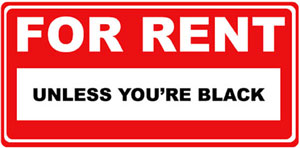By Jesse Muhammad
Rental study finds racial bias in New Orleans

NEW ORLEANS (FinalCall.com) – On April 24, the Greater New Orleans Fair Housing Action Center (GNOFHAC) revealed the results of its recent investigation into race-based rental discrimination in the New Orleans area, including Orleans, Jefferson, St. Bernard, and St. Tammany Parishes. The 25-page study titled “For Rent, Unless You’re Black,” showed that 57.5 percent of landlords discriminated against Black people searching for rental housing as part of the test.
“Race-based housing discrimination is no surprise in many U.S. cities, but discrimination against Blacks in New Orleans was particularly egregious given the housing shortage,” stated GNOFHAC Executive Director James Perry.
“We are disappointed to find such a high rate of discrimination in this investigation. However, the Fair Housing Action Center hopes that the study will inform housing consumers of their rights under fair housing laws. Equal access to housing is a civil right and an essential component in the rebuilding process. Housing providers should be aware that the Fair Housing Action Center will pursue enforcement of all violations covered by applicable fair housing laws,” he said.
GNOFHAC conducted the investigation through the use of fair housing testing–a process whereby equally-suited Black and White testers attempt to apply for housing. The testers were paired by matching incomes, careers, family types and rental histories to inquire about openings at 40 rental properties in the four parishes in New Orleans between September 2006 and April 2007. GNOFHAC compared and contrasted experiences between the two races to determine whether or not discrimination occurred, and found that the testers encountered discrimination in various forms.
For example, Black testers were told apartments were not available, when their White counterparts were told the same units were available; landlords provided Black testers with less favorable terms and conditions for the rental of properties than their White counterparts; and in several instances, Black testers did not receive promised return phone calls while the same landlords returned all calls of their White counterparts.
In another test, an agent told a Black tester who responded to an apartment ad on Jan. 22 that only one unit was available, and not until February. The same agent told a White tester later that day that two units would be available Feb. 1, and mentioned two other units.
According to the study, testers received classroom and field training from GNOFHAC on how to be objective fact-finders and to report, but not interpret, the results of their test. Rental housing units tested were randomly selected from print and Internet listings of available units on a pro-rata basis in each parish. In one test conducted on Mar. 9 in Jefferson Parish, a White tester reported that a landlord said, “We don’t want any loud rap music,” and that she wanted “people that are more settled.” Two Black testers who called about the same rental were not called back. In another test, a Black tester was told the unit rented for $1,000 a month, although it was advertised for $850–the amount the White tester was quoted.
The number of tests conducted in each parish was based upon post-Hurricane Katrina population estimates reported by the U.S. Census Bureau at the beginning of this year–20 in Jefferson; 10 in St. Tammany; nine in New Orleans and one in St. Bernard.
In the singular St. Bernard test, conducted on Mar. 20, a Black tester was driven away by a landlord who said only one of two advertised units was still available, and not for another six weeks. The White tester was told on the same day that two units were available within three weeks, and the landlord said he had received a lot of interest in his rentals, but did not want “certain types of people” moving in.
“You’re our kind of people,” the landlord told the White tester.
“People had the same income qualifications, the same income, same credit and comparable jobs,” Mr. Perry said during the release of the study. “We isolated for race. That was the only difference.”
The study mentioned that there is an extreme case of the lack of affordable rental housing on the Gulf Coast, which hinders many displaced residents from returning home, with businesses in a post-hurricane environment not having a chance for success if their employees do not have a place to live.
“Post-Katrina, we face entirely new challenges,” said Tony Keck, board president of the fair housing action center. “Decisions and actions by those in power have the potential to cement in place for the next 100 years entirely new patterns of discrimination on a grand scale. Not just in housing, but in health care, education, and most other social institutions.”
According to Louisiana statistics, in 2005, Hurricanes Katrina and Rita destroyed over 200,000 homes and apartments throughout the state, with a large majority of them being in New Orleans. The Civil Rights Act of 1968, commonly referred to as the Fair Housing Act, prohibits race discrimination in housing and provides protection to people trying to rent or buy a home, secure a mortgage loan or buy homeowners insurance.
(To read the results of the GNOFHAC study “For Rent, Unless You’re Black,” visit www.gnofairhousing.org or www.mmmhouston.net.)












